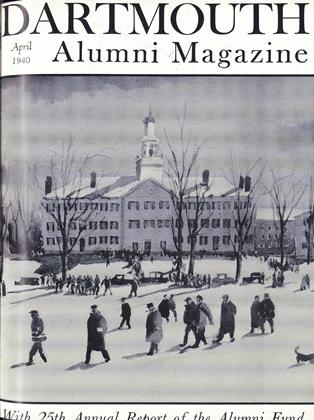VIEWED EITHER AS SENTIMENT OR REASON Dartmouth needs poor boys in its student body. The plain facts are that the College wants them, they in numerous cases want to go to Dartmouth, some of them come to Hanover, but there are not available sufficient resources in many other cases to provide the financial aid required.
Some needs of the College call for amounts of money of very large proportions, usually beyond consideration for all except philanthropists and the great Foundations. But the challenge of providing funds for loans and scholarships to talented youth who seek what Dartmouth has to offer, but who haven't a nickel with which to approach it, is a problem that can be solved by more modest gifts. Increased contributions to the Alumni Fund will help greatly. Contributions to the several regional alumni association scholarships throughout the country are of proven aid. Larger gifts or bequests for the specific purpose of establishing scholarship funds within the endowment of the College achieve an objective worthy of any donor's ambition.
We are much indebted to John Hurd Jr. '21 for pointing out the problem in his article on financial aid policies in these pages this month.
THE FACT THAT DARTMOUTH gave cash and equivalent aid to needy undergraduates last year of $211,000 is proof that a substantial amount of help is given poor boys. The fact that 20% of the student body receives financial aid in the form of scholarships and loans shows that many undergraduates (482 last year) are being helped. In general the College appears to compare favorably with what other colleges are doing, but with some exceptions. One, and the most notable exception, is Harvard where the excellent and very creditable plan of National Scholarships has already in the brief time of its operation proved to be valuable in bringing to that institution a broader scope of representation in geographical location of homes and economic backgrounds of students.
The crux of the problem is clearly that more substantial aid needs to be given to certain boys of outstanding promise. It is probably true that one-fifth of every entering class is a large enough proportion, both for financial and other reasons, to be carried on financial aid. But what is a pressing requirement of the first importance is to give more aid to certain men in this group.
Dartmouth established leadership years ago with its admissions policies, which have become rather generally adopted in recent years—quite in contrast to the lifting of eyebrows that greeted the Selective Process in 1922. Dartmouth's preference for western and southern students is an objective now eagerly sought by others. In respect to policies and resources for financial aid the College has further to go in achieving a front rank and progressive position.
Over the years several new regional scholarships and numerous alumni club funds have been established. They are very helpful. The regional scholarships were conceived by President Hopkins more than 10 years ago. The creation of the California Regional Scholarships to Dartmouth was the first move in a direction now popular among eastern colleges. But if there is confidence that our present needs will be met, there is no room for complacency. We must admit our inability, but not lack of desire, to extend financial aid to especially talented poor boys, from all parts of the country.
 View Full Issue
View Full Issue
More From This Issue
-
 Article
ArticleRich Man's College?
April 1940 By JOHN HURD JR '21 -
 Article
ArticleMeet Bill Daniels—
April 1940 By CHARLES E. WIDMAYER '30 -
 Class Notes
Class Notes1930*
April 1940 By Chairman, ALBERT I. DICKERSON -
 Sports
SportsBig Green Teams
April 1940 By Whitey Fuller '37 -
 Class Notes
Class Notes1925*
April 1940 By Chairman, FORD H. WHELDEN -
 Class Notes
Class Notes1938*
April 1940 By Chairman, CARL F. VON PECHMANN
The Editor
-
 Article
ArticleThe Cover
October 1935 By The Editor -
 Article
ArticlePass the Bowl!
October 1940 By The Editor -
 Article
ArticleNational Attitudes
November 1940 By The Editor -
 Article
ArticleAlumni in Service
June 1941 By The Editor -
 Article
ArticleWar Instruction
April 1942 By The Editor -
 Article
ArticlePublication Schedule
May 1942 By The Editor







